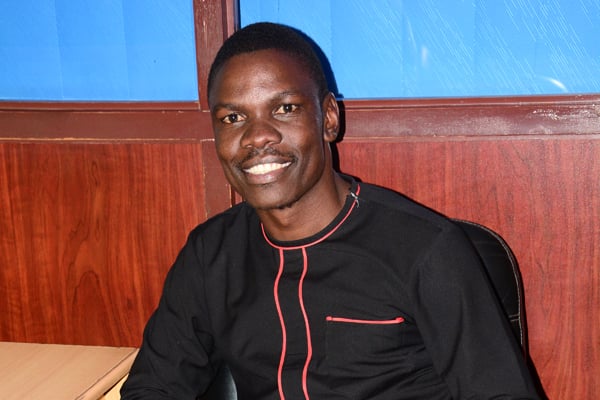How two students used TV, newspapers to pass UCE

Emmanuel Wafefe (left), who got Aggregate 14, and Cyrus Kituyi (right), who scored Aggregate 12, celebrate their good results with their sponspor, Mr Emmanuel Wanyama. PHOTO/ DERRICK WANDERA
On March 18, 2020, shortly after the World Health Organisation (WHO) declared Covid-19 a global pandemic, President Museveni announced the closure of all education institutions, sending home nearly 15 million of the country’s learners.
That was only seven months to the day candidates were meant to begin their Senior Four examinations.
Mr Cyrus Kituyi and Emmanuel Wefefe, both from Trinity Senior Academy in Entebbe, were among the thousands of Senior Four candidates that returned home in Namisindwa District, in eastern Uganda.
In his March 18 address, Mr Museveni also slapped a ban on public gatherings which meant that if any learning was to take place, it had to be by way of home-schooling.
TVs and radios that never came
Government had indicated it would facilitate home-schooling by providing at least one radio set to each of 10 million households. Then as country awaited guidelines for holding the 2021 General Elections, government promised to provide 137,466 solar-powered television sets to the villages.
Each of the country’s 68,733 villages had been earmarked to receive at least two TV sets to facilitate the learning. But it was never clear whether the TV sets were meant to be shared amid calls for strict implementation of standard operating procedures (SOPs) and a ban on gatherings.
At an estimated Shs38,000 per radio set, the government would require Shs380b to supply the radios. Money was, however, never released. By the time the examinations were held, talk about the radios and television sets had fizzled out.
The candidates were left to their own devices. That was Kituyi’s and Wafefe plight, but unlike many other candidates, they at least had access to Television sets at home.
Both Mr Kituyi and Wafefe had to adjust to homeschooling, which had until the outbreak of the pandemic not been quite popular in Uganda.
But to the duo, homeschooling came with dividends. They scored Aggregate 12 and 14 respectively.
The two students told Sunday Monitor that they do not come from “well-to-do families”.
Whereas Kituyi lives in a village that has access to power, there is no TV set in his homestead. He had to rely on the good heart of a neighbour who allowed him to use his TV set for learning during the lockdown.
“I would tune in to NTV and other stations depending on what subjects they were offering and I got to learn a lot. Although I could not ask some of the questions of the topics I had not understood, I went ahead to ask my friends and also called the teachers who had given the lessons because they had left their contacts,” he said.
Challenges
Wafefe was, however, faced with a different challenge. His home village has no access to electric power. The TV set was, therefore, out of reach.
Even when he tried to form discussion groups with friends who live in the same locality, their gatherings were always dispersed by the police and Local Defense Unit (LDU) personnel who were always eager to enforce restrictions imposed to contain the pandemic. He had to find an alternative.
Newspapers were the alternative, but money to facilitate purchases was not readily available. A neighbour came to his rescue.
“I had nothing to do but get newspapers where they would publish study materials and I capitalised on those. Despite the fact that the notes were shallow, they helped me do more research from what I had been given from school. I read widely into the notes I had from Senior One to Three,” Wafefe said yesterday.
“In my village, we only have cinema halls, but they did not allow us to put on local TV stations for us to follow the teachings because they were showing movies. I had to depend on what was available at the moment,” Wafefe said.
Given the economic status of their families, it would have been difficult for the two to achieve what they have without the help of Pure Heart Foundation, a non government organisation (NGO), which helps sustain hardworking, but economically disadvantaged students.
Mr Emmaniuel Wanyama, the founder of the organisation, said he had started with the students in their Senior One after they passed their examinations and had always hoped they would perform even better.
“When the lockdown came, I knew they would be disrupted but I encouraged them to continue reading because I knew where they come from. They have not disappointed but they would have even got better grades,” he told Sunday Monitor yesterday.




